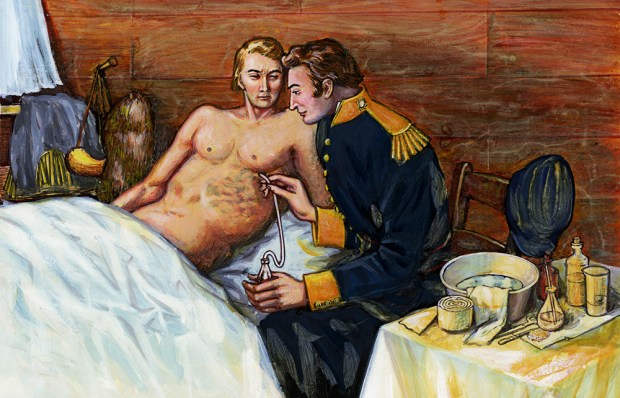Dan Rhodes’s career might be regarded as an object lesson in How Not to Get Ahead in Publishing. Our man was chosen as one of the Best of Young British Novelists in 2003, but his recent exploits include a spectacular falling out with his one-time sponsors, Messrs Canongate, and the writing of a lampoon about Richard Dawkins which so alarmed the lawyers that it had to be issued privately. Significantly, Sour Grapes — his first novel for seven years — comes courtesy of a small, independent press of which I confess that I had not previously heard.
In most hands, these serial misfortunes could be guaranteed to produce a full-frontal assault on the people and institutions thought to have let the proud author down. Oddly enough, though billed as ‘a hilarious satire… which takes no prisoners’, Sour Grapes turns out to be more of a book trade romp than a no-holds-barred demolition of the citadels of modern day literary power. There has been talk of libel writs, but it would take an exceptionally sensitive plant to be offended by some of the exposés of authorial vanity on display in this account of the ‘sleepy English village’ of Green Bottom’s attempt to stage a book festival.
Although there are cameos of Salman Rushdie and J.K. Rowling, the principal guest — and chief butt of Rhodes’s asperity — is the tall, saturnine, thesaurus-ingesting (literally at one point) figure of ‘Wilberforce Selfram’. The plot, which involves an organisation known as MI7 deluding the nation’s young into regarding Selfram as the country’s ‘leading alternative public intellectual’, is amusingly preposterous, and there are some quite good jokes about the Guardian. But the novel’s main drawback is quite how off the pace it feels as a survey of the modern literary scene.
In an afterword which (again, quite amusingly) anticipates the novel’s reception, Rhodes notes that ‘authors were wheeled out to defend the publishers, to let it be known that they didn’t recognise Rhodes’s depiction of their industry’. In fact, many of the things Sour Grapes laments — snootiness and snobbery, for example — were on the way out a decade and a half ago. There is, God knows, a satirical novel waiting to be written about the modern literary scene, but it would be much better set in a university creative writing department or in the offices of a provincial writers’ centre. Poor old Wilberforce Selfram is too soft a target.
Got something to add? Join the discussion and comment below.
Get 10 issues for just $10
Subscribe to The Spectator Australia today for the next 10 magazine issues, plus full online access, for just $10.
You might disagree with half of it, but you’ll enjoy reading all of it. Try your first month for free, then just $2 a week for the remainder of your first year.














Comments
Don't miss out
Join the conversation with other Spectator Australia readers. Subscribe to leave a comment.
SUBSCRIBEAlready a subscriber? Log in